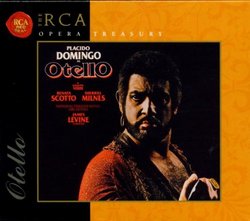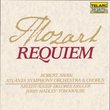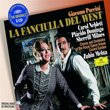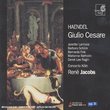| All Artists: Renata Scotto, Jean Kraft, Frank Little, Sherrill Milnes, Paul Plishka, Malcolm King, Peter Crook Title: Verdi - Otello / Plácido Domingo, Scotto, Milnes, Levine Members Wishing: 0 Total Copies: 0 Label: RCA Release Date: 7/28/1998 Genre: Classical Style: Opera & Classical Vocal Number of Discs: 2 SwapaCD Credits: 2 Other Editions: Giuseppe Verdi - Otello -Carlos Kleiber / Domingo Freni (Exclusive) UPC: 743213950129 |
Search - Renata Scotto, Jean Kraft, Frank Little :: Verdi - Otello / Plácido Domingo, Scotto, Milnes, Levine
 | Renata Scotto, Jean Kraft, Frank Little Verdi - Otello / Plácido Domingo, Scotto, Milnes, Levine Genre: Classical
This is Plácido Domingo's first recording of his signature role, and what he can't do with sheer vocal force, he accomplishes somewhat less resourcefully with vocal color, of which he has plenty. The main draw, though... more » |
Larger Image |
CD DetailsSynopsis
Amazon.com This is Plácido Domingo's first recording of his signature role, and what he can't do with sheer vocal force, he accomplishes somewhat less resourcefully with vocal color, of which he has plenty. The main draw, though, is Renata Scotto's dramatically acute Desdemona, recorded a tad late (1978) in her vocal life but better than not at all. The villainous Iago is the vocally gleaming but unsubtle Sherrill Milnes. James Levine's conducting is a bit green, a bit bombastic, and propulsive in a one-dimensional way, though one must remember he was working with the National Philharmonic, a pick-up orchestra rather than a seasoned opera ensemble. --David Patrick Stearns Similar CDs
|
CD ReviewsWorth having for Renata Scotto. Gerardo Cabrera Munoz | México | 08/27/2000 (4 out of 5 stars) "This was an eagerly expected recording in 1978. Domingo made his sensational Otello debut in La Scala in 1976 with Carlos Kleiber conducting and it was only a matter of time before he recorded the role for RCA. Unfortunately his first recorded Otello seems just a little bit tentative, not nearly as committed as his La Scala performances or his two other commercial recordings, especially the Chung in DG which is a great performance of towering stature. Milnes is fine as Iago, not as interesting as Gobbi, but sound and efficient. But it is the great Renata Scotto who gives a commanding performance, a regal performance as Desdemona. Sure, her voice is not as beautiful or large as Tebaldi's or Margaret Price's, but she gives Desdemona credibility, whereas la Tebaldi for all the beautiful sounds she makes, sings her as a dumb blonde. For her alone this Otello is memorable and worth owning. If you want Domingo at his best, go for the better conducted Myung Whun-Chung version." The Best Otello on Disc 05/09/2002 (5 out of 5 stars) "Otello is arguably the greatest of all operas, but its three lead roles are extremely difficult and the role of the conductor is not easy either. This makes Otello one of the toughest operas to pull off and all of the available recordings have their share of problems. This James Levine recording is the best available because it has the fewest problems. Let's start with the lead role. Domingo is in wonderfully youthful voice (he was still under 40 when the recording was made). He produces a glowing heroic tone and none of the vocal challenges of the role are beyond him. Whereas other tenors, such as Vickers and McCracken, can't handle the high note in the Second Act recitative with Iago and make an ugly sound as a result, Domingo has no problem with it. His naturally dark voice was perfectly suited to the role and he is almost certainly the best Otello on record. There is nothing wrong with his characterization on this recording either. His dramatic points of emphasis strike the listener as wholly appropriate and he doesn't ham up the two big solos as many other singers do. Perhaps he does not sound as tormented as Vickers, but there is no question which of the two does the better singing. Renata Scotto's performance as Desdemona is wonderful. It is vocally slightly flawed, but it is intensely characterful. There is probably no other soprano who has so effectively conveyed Desdemona's anguish and fear. She works very effectively with Domingo and their account of the First Act love duet is very beautiful. Sherrill Milnes is outstanding as Iago. His powerful voice is very well suited to the role and he had a great talent for playing evil characters - Iago being the most evil of all. Many critcize him for not being characterful, but the recording proves otherwise. He is variously menacing and charming and his overall characterization sounds just right. The minor roles are all reasonably well taken. Frank Little, Jean Kraft and Paul Plishka are all efficient as Cassio, Desdemona and Lodovico respectively. The character-tenor Paul Crook stands out in the tiny role of Roderigo, putting in a very credible performance as Iago's rather dim-witted foil. Levine himself does a fine job. As so often in his Verdi recordings, he follows Toscanini's example and keeps the level of tension high, often producing some electrifying moments. His is a very direct, perhaps conventional, reading but it is good that he lacks the distracting eccentricities in this work that plague recordings by others, such as Karajan. The London pick-up orchestra, the National Philharmonic, don't sound great in a couple of episodes, but, for the most part, they follow Levine very well. If you can buy just one recording of Otello, this is the one to get." Best Otello Recording! Anibal Salazar | New York, New York | 12/19/2007 (5 out of 5 stars) "I am well aware that this review may upset many people. Many hold Domingo's final recording on DG as his best, and though it has its great qualities, it cannot compare with the sheer beauty of this one. I am also aware that many do not consider DOmingo the greatest Otello (as there are many other great ones), but while Del Monaco, Vickers, and Vinay have more vocal power than Domingo, his lyricism greatly exceeds theirs. One only needs to listen to love duet at the end of Act One and compare the subtlety beauty of Domingo's voice whereas Del Monaco stumbles with subtle singing. Domingo's Otello is not the fierce beast that Verdi (a racist) had asked from Tamagno. Otello is ultimately a man that lives, thinks, feels. And that is why I love Domingo's Otello over the others. He embodies a human being without ever taking away his dignity. Otello is in fact a tragic hero at the end and not a monster who's stupidity and cruelty has lost the audience's dignity. It is true that Domingo may not sound like the most tormented of Otellos, but his is the most heroic and tragic.
In order for Otello's role to truly shine, there must be two great singers playing beside him and struggling to win him over. In this case, Milnes' Jago and Scotto's Desdemona come through in best way. Scotto's Desdemona is sung purely and wonderfully, giving us a true portrait of the angel that Verdi wrote. The concertante at the end of Act 3 is one of the most beautiful moments of this recording and probably the best recorded. Milnes' Jago is fiery and even comical. Nobody sings the Drinking Song better or the "Credo" with more conviction. I am aware that many people feel that Levine's conducting is erratic and purposeless, but I beg to differ. While it may not match the scope of Karajan's or angelic force of Kleiber's, Levine gives the singers the effective accompaniment with an orchestra that is not necessarily always on top of things. A great moment for Levine is in Act One during the sword fight between Montano and Cassio. We hear the swords in the background, but eventually they sounds of the battling swords are taken over by the percussions in the Orchestra. The transition is seemless and sounds extremely natrual. Most conductors miss this detail and as a result the intensity of the sword fight is lost, making Otello's powerful entrance with "Abbasso le spade" less effective. Levine's conducting in the love duet that follow takes the music to a sublimity matched only by Karajan. His accompaniment in the Credo adds cynicism to the overall atmosphere of the work. And the ending is simply incredible in every way. I know many will disagree with my review, but I would like to remind everyone that it is my opinion regarding my favorite opera and what I consider the GREATEST opera ever written." |

 Track Listings (20) - Disc #1
Track Listings (20) - Disc #1







